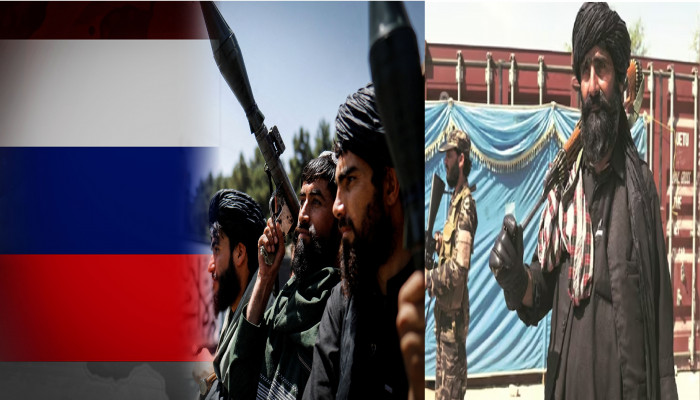Russia boosts Taliban ties with focus on common adversary ISIS
- In Reports
- 12:58 PM, Apr 25, 2025
- Myind Staff
Almost a year after Russian President Vladimir Putin referred to Afghanistan's Taliban as an "ally" in the fight against terrorism, Moscow has lifted a ban that had been in place for two decades. This move is aimed at strengthening ties with Kabul to jointly fight a common enemy — the Islamic State.
John Herbst, senior director of the Atlantic Council's Eurasia Center, said the action was "no surprise" because Putin has mentioned increasing collaboration with the Taliban on counterterrorism. According to him, his remarks were "specifically directed against ISIS," who took credit for the horrific Crocus City Hall terrorist attack in March 2024. According to independent Afghan political analyst and human rights campaigner Faizullah Jalal, the ruling will also "open the door for official recognition of the Taliban government," which has been shunned since seizing control in Afghanistan almost four years ago. Although no country has officially recognised the Taliban government, which has been widely criticised for repeated human rights abuses, the Foreign Ministry in Kabul announced on Wednesday that Russia has agreed to accept a diplomat at the ambassador level in Moscow.
Russia’s careful and slow approach to building ties with the Taliban — a group it had banned as a terrorist organisation in 2003 — shows that both sides see advantages in improving their relationship. For Russia, closer ties help protect against terrorism at home and in Central Asia. For the Taliban, it boosts their efforts to gain international recognition and could attract foreign investment to support their struggling economy.
As part of those early efforts, Sergei Shoigu, the head of Russia’s Security Council, made an uncommon trip to Kabul in November and met with several top officials. Russia is also one of the few countries, along with China, that has allowed Taliban diplomats to visit its capital. “Russia aims to build mutually beneficial ties with Afghanistan in all areas, including the fight against drugs and terrorism,” the Foreign Ministry in Moscow said in a statement after the court decision legalising the Taliban. The Kremlin didn’t reply to a question on plans to recognise the Taliban government officially.
Several terrorist groups operate from Afghanistan, but the one considered the “greatest threat” both in the region and internationally is the Islamic State Khorasan. According to a research paper from the Congressional Research Service in Washington, this group is a local branch of the larger ISIS organisation. ISIS-K claimed responsibility last year for the deadliest attack in Russia in over 20 years, which killed at least 137 people.
ISIS-K was formed around 2014 or 2015, mainly by members who left the Afghan Taliban and Tehrik-e Taliban, a group focused on toppling Pakistan’s government. As of April 2024, ISIS-K was believed to have between 2,000 and 5,000 fighters. The US National Counterterrorism Centre called the group one of the Islamic State’s “most lethal branches,” noting that its fighters have killed or wounded thousands of people in Afghanistan and Pakistan. Improving relations with Kabul hasn’t been easy for Moscow because of its complex past.
Back in 1979, the Soviet Union invaded Afghanistan and spent ten years fighting the Mujahideen — a group that includes some of today’s Taliban leaders. Although trade between the two countries grew by 18 per cent in the first eight months of 2024 compared to the same time in 2023, it still stayed low at around $227 million, according to Afghanistan’s Ministry of Industry and Commerce. Building normal relations could help boost trade and business between them.
As reported by the Tass news agency, Russia’s Foreign Affairs Ministry said late last year it wants to work on energy and agriculture projects with the Taliban. By the end of last year, Afghanistan had also become the top buyer of Russian flour. Moscow’s decision to remove the Taliban from its list of terrorist groups might encourage other neighbouring countries to do the same.
“Some of Russia’s close allies in Central Asia or in wider Asia are expected to follow suit if the Taliban are designated as a terrorist there, while other countries, especially in the West, will most likely reject it,” Jalal said Kazakhstan’s Deputy Prime Minister, Serik Zhumangarin, recently visited Kabul and talked with top Taliban officials about investment opportunities and ways to increase trade.
Russian Foreign Minister Sergei Lavrov said on Wednesday, according to Tass, that "the authorities in Kabul are a reality that needs to be reckoned with if one is to conduct a pragmatic and non-ideology-driven policy." He also mentioned that Russia supports the release of frozen Afghan state reserves that are currently held in the US. Although both the Taliban and Islamic State believe in enforcing strict Sharia law, they are actually enemies and often fight each other.
The Taliban see "ISIS-K" as the biggest danger to their rule. Even though they have stepped up efforts to fight the group, they haven’t been able to destroy it completely. Since 2023, this terrorist group has killed several top Taliban leaders. "ISIS-K" has also launched rocket attacks across the border into Uzbekistan and Tajikistan, attacked the Russian and Pakistani embassies in Kabul, and carried out an assault on a Kabul hotel popular with Chinese nationals.
“Putin knows the potential terrorism threats emerging from Afghanistan toward Central Asia, which could jeopardise the entire region’s security or Russia’s interests in those countries,” said Jalal. “Building closer ties with the Taliban could help stop those threats.”







Comments